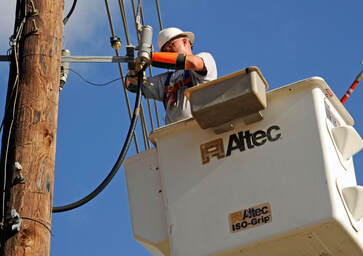Archives
May 2020
Categories
All
|
Back to Blog

Power outages and interruptions happen. If they happen often enough or for long enough you could be eligible for compensation from DTE and Consumers Energy. The Michigan Public Service Commission (MPSC) Service Quality and Reliability Standards requires utility companies to compensate customers for losses associated with power outages. Rules regarding outage service credits and eligibility requirements can be found in the MPSC’s Service Quality and Reliability Standards. These standards provide customers a $25 credit upon request if the utility’s investigation of your request determines you have experienced a qualifying outage.
There are 3 types of available credits:
An investigation will be conducted and a decision will be rendered within 30 days. Your claim will be summarily denied if:
0 Comments
Read More
Back to Blog
Emergency Fund part of your safety net10/21/2019 
Financial shocks are inevitable during a lifetime. “Stuff happens,” according to the PG-rated version of that cliche. When it does, my language is more NC-17. Nevertheless, happen it does. The most common financial shocks for working-class families are:
What is an emergency fund? It is a “liquidity buffer” between you and ruin. If you have very little saved — say $200 to $500 — each additional dollar you set aside dramatically reduces your likelihood of falling into financial hardship. It can be any of these items. Some are decidedly better options than others:
Forget the 3 to 6 months of take-home pay that is commonly parroted throughout financial media and literature. This goal is often unattainable for low-income wage earners. A more realistic minimum target is $2,467. A fund of this amount will be sufficient for most emergencies. Having such a fund stops you from getting stuck with short term remedies with long term consequences like being late on rent or borrowing from a payday lender. Often creating a cycle of cash draining late fees and prolonged financial insecurity. Building an emergency fund is your #1 priority. You should well establish an emergency fund before you divert resources to the very prudent debt reduction strategy necessary for your long term success. You should continue or start making all minimum payments on time and continue to do so until your emergency is well funded. Debt reduction is achieved by consistent application of payment to the principal balance. Having an emergency fund will let you maintain a good payment history so you won’t have to “rob Peter to pay Paul” when the inevitable happens. One missed credit card minimum payment can close off what may be a critical asset during a financial emergency and put a big hole in your safety net. Modified universal default terms may render a late payment to one lender a catastrophe in your creditworthiness regardless of your actual payment history. Your ability to borrow should be viewed as part of your safety net. It creates capacity and demonstrates financial capability. Your credit card cash advances and spending limits are critical components that can help mitigate some of the impacts of an emergency while buying you time. An excellent credit score can give you immediate access to additional money during an emergency. It is a MoneySmartLife strategy to responsibly and proactively expand your borrowing capacity annually. Just as your net worth expands annually, so should your credit capacity. They weave your safety net tighter and softer.
Back to Blog

Where does the money go? Answer: holes in your spending plan or spending leaks.
A spending leak is an uncontrolled expenditure of resources. Spending leaks are caused by a variety of reasons, both personal and economic. Common examples of spending leaks are susceptibility to impulse purchases, routinely paying credit card interest, or using energy inefficiently. Whether small or large, leaks add up and reduce the chances of achieving your goals. Sometimes spending leaks are hidden or camouflaged. So they have to be discovered. Others are more apparent. Once discovered spending leaks must be fixed. Fixing a spending leak may be quick or require a long term behavior change. All are repairable with varying degrees of difficulty. Here is one spending leak repair that is sustainable. It is a behavior change that eliminates a leak for a lifetime. Make a quality decision to Stop Paying Fees. A quality decision is one from which there is no retreat. Most people don’t make a lot of those in their lives. Nor should they. But you can on this one. Just set your jaw, head down, and just do it. Fees are not interest. They are other charges for privileges or penalties you have accessed through your actions. If you don’t access them, you don’t pay. It may take a strategy and some time to sustainably eliminate all fees but it can be done.I have for decades. Here are 5 fees to never pay again. When it comes to my money I see paying these fees as a self-inflicted wound. Those are the worse kind. I decided to stop hurting myself on purpose.
|
MONEYSMARTLIFE.ORG EMPOWERING SUSTAINABLE FINANCIAL WELL-BEING IN WORKING CLASS FAMILIES

 RSS Feed
RSS Feed

